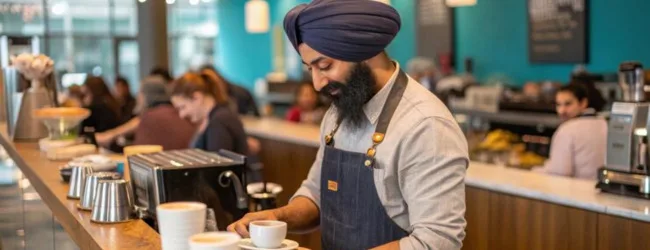Table of contents
Are you dreaming of owning your own business and having a passion for coffee? A coffee shop Business in India could be the perfect blend of entrepreneurship and a thriving market. India’s coffee culture is booming, with people increasingly seeking out quality brews and cosy café experiences. This comprehensive guide will walk you through the essential steps, costs, popular brands, and profit potential of starting your own coffee shop Business.
Why Choose a Coffee Shop Business?

Opting for a model offers several advantages over starting a coffee shop from scratch:
- Established Brand Recognition: You benefit from the goodwill and customer base of a well-known brand. Think of the instant recognition associated with names like Café Coffee Day or Starbucks.
- Proven Business Model: They come with established operational procedures, marketing strategies, and supply chain networks, reducing the risk of failure.
- Training and Support: Franchisors typically provide comprehensive training and ongoing support in areas like operations, marketing, and management.
- Easier Access to Financing: Banks and financial institutions may be more willing to lend toes of established brands.
- Reduced Marketing Efforts: The franchisor often handles national-level marketing campaigns, saving you time and resources.
Also, check out the franchise of Café Coffee Day – Check Out
Step-by-Step Guide to Starting Your Coffee Shop Business

Embarking on your coffee journey requires careful planning and execution. Here’s a step-by-step guide:
1 . Self-Assessment and Research:
- Evaluate your financial capacity: Determine how much you can invest.
- Identify your interests: Which coffee shop brands resonate with you and align with your business goals?
- Understand the local market: Research the demand for coffee shops in your desired location. Are there specific customer preferences or demographics to consider?
- Explore different opportunities: Investigate various coffee shops available in India.
2 . Business Selection and Due Diligence:
- Shortlist potentials: Based on your research, narrow down your options.
- Request information: Contact the franchisors and obtain detailed information about their model, fees, support system, and requirements.
- Review the Disclosure Document (FDD): This crucial document contains vital information about the franchisor, the system, costs, obligations, and legal aspects. Carefully scrutinise this document and consider seeking legal advice.
- Talk to existing customers: Connect with current customers to gain firsthand insights into their experiences, challenges, and profitability. This can provide invaluable real-world perspectives.
- Visit existing locations: Observe the operations and customer flow of existing outlets.
3 . Financial Planning and Arrangement:
- Detailed cost analysis: Understand all the initial and ongoing costs involved (more on this below).
- Develop a business plan: This comprehensive document outlines your business strategy, market analysis, financial projections, and operational plan. A well-structured business plan is essential for securing funding.
- Secure financing: Explore various funding options, including personal savings, loans from banks and financial institutions, and potentially investors.
💡 Pro Tip: If you want to start a business but have too many doubts, connect with a business expert from Boss Wallah for guidance – Check Out
4 . Legal Formalities and Agreement:
- Engage a lawyer: A legal professional specialising in agreements can help you understand the terms and conditions of the agreement.
- Negotiate the agreement (if possible): While most terms are standard, some aspects might be negotiable.
- Sign the agreement: Once you are satisfied with the terms, formally sign the agreement.
5 . Location Selection and Setup:
- Identify a suitable location: High foot traffic areas, proximity to offices, colleges, or residential areas are generally preferred. Consider factors like visibility, accessibility, parking, and competition.
- Secure the lease agreement: Negotiate the terms of the lease for your chosen location.
- Obtain necessary permits and licenses: Ensure you have all the required legal permissions to operate a food business in your chosen location. This can include shop and establishment licenses, food safety licenses (like FSSAI), and fire safety clearances.
- Design and build-out the coffee shop: Work with the franchisor’s guidelines and your budget to create an appealing and functional space.
6 . Training and Staffing:
- Undergo franchisor training: Participate in the training programs provided by the franchisor to understand their operational procedures, product knowledge, and customer service standards.
- Recruit and train your staff: Hire competent and customer-oriented staff. Provide them with adequate training on coffee preparation, customer service, and operational procedures. Well-trained staff are crucial for customer satisfaction.
7 . Launch and Operations:
- Implement pre-opening marketing: Generate buzz and create awareness about your upcoming coffee shop.
- Grand opening: Plan a successful launch event.
- Day-to-day operations: Adhere to the franchisor’s operational guidelines, maintain quality standards, and focus on excellent customer service.
- Marketing and promotion: Implement local marketing strategies in coordination with the franchisor’s national campaigns.
Popular Coffee Shop Business Brands & Cost in India
India boasts a diverse range of coffee shops, catering to different budgets and target audiences. Here are a few prominent examples:
Café Coffee Day (CCD)
- Concept: CCD was built on the concept of providing a relaxed and casual space for young Indians to socialise, work, or simply unwind over coffee. They positioned themselves as more than just a coffee shop, aiming to be a “hangout” spot.
- Estimated Cost: ₹9 to ₹10 lakhs (This includes equipment and interior setup, roughly ₹3 to ₹4 lakhs. A brand fee of ₹50,000 is also applicable).
- Official Website: Cafecoffeeday
Barista Coffee
- Concept: Barista aimed to bring a more “coffee culture” experience to India, often perceived as slightly more premium than CCD in its early days. Their concept revolved around offering a wider variety of coffee preparations and a more sophisticated café ambience.
- Estimated Cost: ₹20 lakhs to ₹40 lakhs (This can vary based on the model, such as a café or diner format. The setup cost for a café model is around ₹32 lakhs, and for a diner, it’s ₹65-70 lakhs. The fee is ₹8.5 lakhs for a café and ₹20 lakhs for a diner. Working capital can range from ₹1.5 to ₹6 lakhs, depending on the model. There’s also a/brand fee mentioned as ₹5,00,000 in another source.
- Official Website: Barista
Starbucks
- Concept: Starbucks is globally recognised for its “third place” concept – a comfortable environment between home and work where people can connect, relax, and enjoy high-quality coffee.
- Estimated Cost: While Starbucks does not officially disclose costs in India, the estimated rent for an outlet is around ₹6 lakhs, and the initial fee is estimated to range between ₹25 lakhs to ₹40 lakhs. It’s important to note that Starbucks typically doesn’t grant to individuals without prior business experience.
- Official Website: Starbucks
Costa Coffee
- Concept: Costa Coffee, a British brand, positions itself on delivering “perfected coffee,” emphasising the quality of their beans and the skill of their baristas.
- Estimated Cost: ₹1 Cr to ₹1.5 Cr total investment is required to set up a Costa Coffee. Another source indicates a total investment between ₹34 lakhs to ₹48 lakhs, including a fee of ₹4 lakhs to ₹8 lakhs and infrastructure investment of ₹30 lakhs to ₹40 lakhs. A royalty fee of approximately 5% on gross sales is also applicable.
- Official Website: Dil-Rjcorp
The Coffee Bean & Tea Leaf
- Concept: Originating from Southern California, The Coffee Bean & Tea Leaf emphasises both coffee and tea, offering a diverse menu of high-quality beverages.
- Estimated Cost: ₹50 lakhs to ₹1 Cr.
- Official Website: Coffeebean
Local and Regional Brands
- Concept: The concepts of local and regional brands are highly varied. Some might focus on a specific regional coffee blend or traditional snacks, catering to local tastes and preferences.
- Cost: The cost for local and regional brands can vary significantly depending on the brand’s size, popularity, and business model. It’s advisable to research specific local options in your area to get accurate cost estimates.
- Official Website: You would need to research the specific local or regional brands you are interested in to find their official websites.
ALSO READ – Haldiram Franchise in India: Cost, Requirements, Profit Margin & More
Profitability Guide for Coffee Shops

The profitability of a coffee shop depends on various factors, including:
- Location: High foot traffic locations generally lead to higher sales.
- Operating Efficiency: Effective cost management and efficient operations are crucial.
- Customer Service: Excellent service leads to repeat customers and positive word-of-mouth.
- Marketing and Promotions: Successful marketing campaigns can drive sales.
- Product Quality and Pricing: Offering high-quality products at competitive prices is essential.
- Royalty and Fees: The percentage of sales paid as royalty will impact your profit margin.
While it’s difficult to provide exact profit figures without specific brand and location details, a well-run coffee shop can potentially achieve a profit margin of 10% to 20% or even higher after covering all expenses.
Drawbacks of a Coffee Shop Business
- Business Fees and Royalties: You’ll need to pay an initial fee and ongoing royalties (usually a percentage of your sales) to the franchisor. These fees can significantly impact your profitability.
- Lack of Flexibility and Control: agreements often come with strict rules and regulations regarding menu, branding, suppliers, and operational procedures. This limits your flexibility to adapt to local market conditions or implement your own creative ideas. For instance, you might not have the freedom to source coffee beans from a local roaster even if you believe they offer superior quality.
- Dependence on the Franchisor: Your success is tied to the reputation and performance of the overall system. If the franchisor faces negative publicity or makes poor strategic decisions, it can negatively impact your business, even if your local operation is excellent.
- Marketing Restrictions and Fees: While the franchisor often handles national marketing, you may have limited control over local marketing strategies and may still be required to contribute to national marketing funds, even if those campaigns don’t directly benefit your outlet.
- Renewal Challenges: The agreement has a limited term, and renewal is not always guaranteed. The franchisor may decide not to renew for various reasons, even if your business is performing well.
- Exit Strategy Limitations: Selling a business can be more complex than selling an independent business, as it often requires the franchisor’s approval and may involve specific transfer fees and procedures.
ALSO READ | How to Start a Franchise Business: Invest Small, Earn Big with 8 Simple Steps
Key factors to maximise profitability
- Effective inventory management: Minimise waste and optimise stock levels.
- Efficient staff scheduling: Optimise labour costs based on customer traffic.
- Upselling and cross-selling: Encourage customers to purchase additional items.
- Loyalty programs: Retain existing customers and encourage repeat business.
- Menu optimisation: Regularly review your menu and pricing to maximise profitability.
Need Expert Guidance?
Starting a business can be challenging, but you don’t have to do it alone! At Boss Wallah, our 2,000+ business experts are ready to provide valuable insights and guidance. Whether you need help with marketing, finance, sourcing, or any other area of business, our business experts are here to help you succeed. Check Out
Confused about Which Business to Start?
Want to start your own business but unsure which one to choose? Explore Boss Wallah, where you’ll find 500+ courses by successful business owners, featuring practical, step-by-step guides on starting and growing various businesses.
Find your perfect business idea today – Check Out
Conclusion
Starting a coffee shop in India presents a promising business opportunity in a growing market. By carefully researching different brands, understanding the costs involved, developing a robust business plan, and focusing on operational efficiency and customer satisfaction, you can brew your own success story in the vibrant Indian coffee landscape. Remember to conduct thorough due diligence and seek professional advice before making any investment decisions.
Frequently Asked Questions (FAQS)
1 . What is the typical tenure of a coffee shop Business agreement?
- Generally, agreements range from 5 to 10 years, with options for renewal depending on the franchisor and your performance.
2 . Do I need prior experience in the food and beverage industry to own a coffee shop?
- While prior experience can be beneficial, most franchisors provide comprehensive training and support, making it possible for individuals with strong business acumen and a passion for the industry to succeed.
3 . What kind of support can I expect from the franchisor?
- Support typically includes initial training, site selection assistance, marketing materials, operational manuals, ongoing guidance, and sometimes supply chain support.
4 . How long does it typically take to break even and start making a profit?
- The breakeven point can vary significantly based on your initial investment, location, operating efficiency, and sales. It can take anywhere from 1 to 3 years or longer.
5 . Can I choose my own menu items, or do I have to follow the franchisor’s menu?
- Generally, you will need to adhere to the franchisor’s standard menu to maintain brand consistency. However, some franchisors may allow for limited local customisation.
6 . What are the key factors to consider when choosing a location for my coffee shop Business?
- Key factors include foot traffic, visibility, accessibility, proximity to target customers (offices, colleges, residential areas), parking, and the level of competition.
7 . How much working capital should I have in addition to the initial investment?
- It’s advisable to have at least 3 to 6 months of operating expenses as working capital to cover unforeseen costs and ensure smooth operations during the initial phase.
8 . What are the ongoing responsibilities of a coffee shop business?
- Ongoing responsibilities include managing daily operations, maintaining quality standards, providing excellent customer service, adhering to the Business agreement, and participating in local marketing efforts.
9 . Can I sell my coffee shop Business in the future?
- Most Business agreements have provisions for the transfer or sale of the Business, but it typically requires the franchisor’s approval and may involve certain fees.
10 . What are some common challenges faced by coffee shop businesses in India?
- Common challenges can include high competition in certain areas, managing operational costs, maintaining consistent quality, and adapting to changing consumer preferences.


